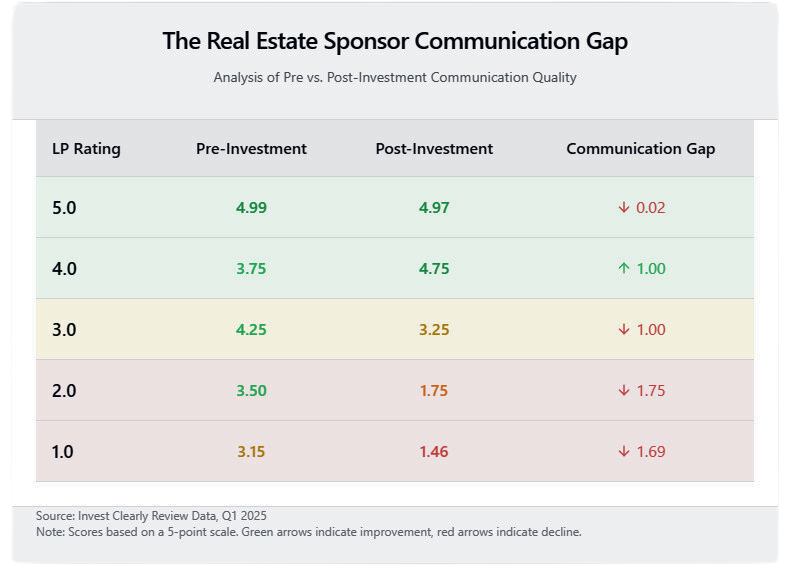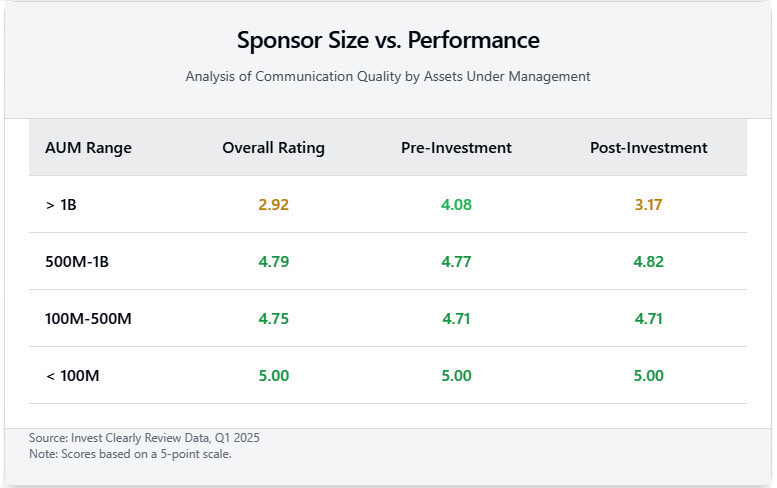
Investor Experience Index: The Pre/Post Investment Communication Gap (Q1 2025)
Never miss an Invest Clearly Insights article
Subscribe to our newsletter today
In an analysis of limited partner reviews, a concerning pattern emerges in real estate sponsor-investor relationships: the notable disparity between pre and post-investment communication quality.
While most sponsors excel during the fundraising phase, averaging pre-investment communication scores above 3.0 even in otherwise poorly-rated investments, these scores drop dramatically after capital is committed. This "communication cliff" is most pronounced in poorly-rated investments, where post-investment communication scores plummet by up to 1.75 points on a 5-point scale.

The data reveals three distinct tiers of sponsor performance:
Elite Performers:
- Maintain consistent communication quality throughout the investment lifecycle
- Show minimal drop-off between pre and post-investment metrics
- Average 4.99 pre-investment and 4.97 post-investment scores
Middle Tier:
- Experience moderate communication decline post-investment
- Maintain acceptable but reduced engagement levels
- Show varied performance across metrics
Underperformers:
- Display the sharpest decline in communication quality
- Pre-investment scores average 3.15, dropping to 1.46 post-investment
- Often accompany misaligned expectations and leadership concerns
The Size Paradox
Further analysis reveals a counterintuitive relationship between sponsor size and investor satisfaction. Despite having greater resources for investor relations, the largest sponsors (>$1B AUM) show notably lower satisfaction rates, averaging 2.92 overall compared to 4.79 for mid-sized sponsors ($500M-1B).

This "size paradox" appears most pronounced in post-investment communication:
- $500M-1B sponsors: 4.77 pre-investment rises to 4.82 post-investment
- <$100M sponsors: Maintain consistent 5.00 ratings across both phases
- $1B AUM sponsors: 4.08 pre-investment drops to 3.17 post-investment
Mid-sized sponsors appear to hit a sweet spot, combining institutional-quality resources with maintained personal attention. This suggests that communication challenges may be more about scalability than resources, with larger organizations potentially struggling to maintain the personal touch that characterizes successful investor relations.
For LPs, this analysis underscores the importance of investigating a sponsor's long-term investor relations track record. High-touch fundraising communication, while common, may not translate to sustained engagement throughout the investment period. The data particularly suggests that size and resources alone don't guarantee better investor communication - and may actually predict the opposite.
Written by
Invest ClearlyInvest Clearly empowers you to make informed decisions by hosting unbiased reviews of passive investment sponsors from verified experienced investors.
Other Articles

Real Estate Recapitalizations—What Passive Investors Need to Know
A recapitalization is a restructuring of a property's capital stack (the mix of debt and equity that finances an investment). While they can be legitimate business strategies, transparency can be an issue.

How to Evaluate a Potential Investment Using the FUND Framework
The FUND framework is a simple way to evaluate opportunities by looking at four pillars: Financials, Underlying Assets, Notable Differentiator, and Delegation of Responsibilities.

What Needs to “Die” in Passive Investing – According to Guests of The Invest Clearly Podcast
Get the answer to the closeout questions of each podcast episode: “What do you think needs to die in passive investing?” The answers are wide-ranging, from misconceptions about risk, to misleading marketing tactics, to structural issues in how deals are presented.

Passive Real Estate Investing Advice from Experienced LP Investors
Experienced LPs shared their most valuable lessons, drawn from years of investing across various asset classes and sponsor relationships.

How Developers Mitigate Construction Risk to Protect Investors
Investing in multifamily development through a real estate syndication can be highly rewarding, but many passive investors wonder: What about construction risk? Delays, cost overruns, or unforeseen site conditions can feel intimidating if you’re new to the space.

The Passive Investor’s Guide to Ground-Up Multifamily Development
Ground-up multifamily development gives investors access to a proven asset class, long-term appreciation potential, and the ability to diversify outside of traditional stocks and bonds. This guide explains how the process works, why development is a strong choice for investors, the pros and cons to consider, and the steps to get started.